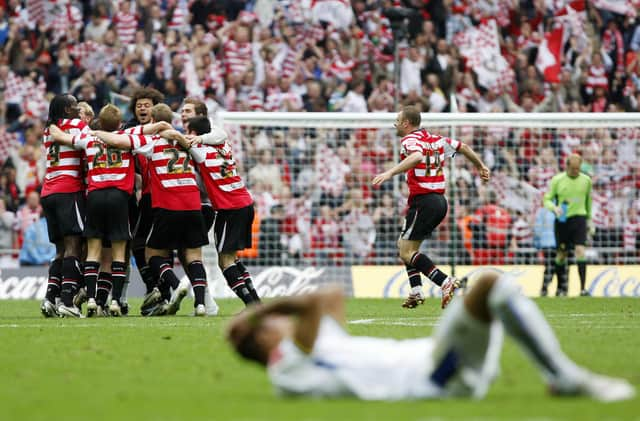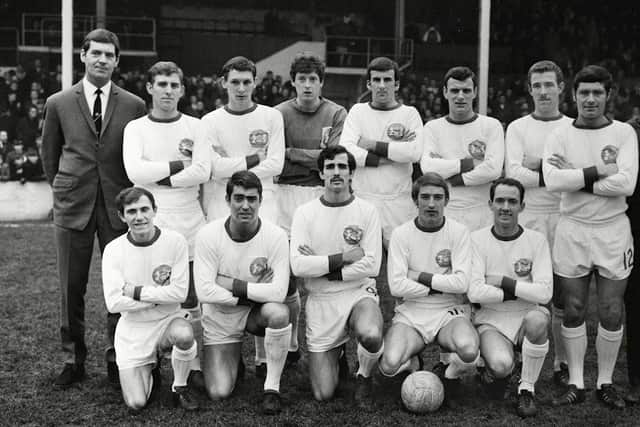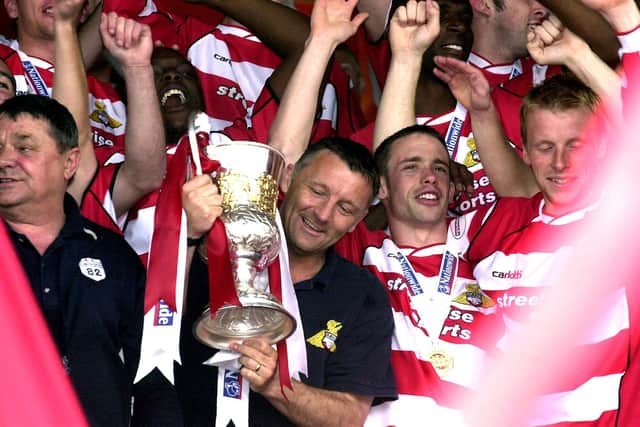Retro Rovers: It’s not how you start the season, or is it?


We had won only two of our opening 10 league games in 2017 – the season we went onto finish 15th in League One under Darren Ferguson.
To be fair, back then, he had a point.
Not since the 2002-03 Football Conference season, which ended in promotion via the play-offs, had Rovers won more than five of their opening 10 league games.


Advertisement
Hide AdAdvertisement
Hide AdThey won six that season, and five each in the promotion seasons of 2012-13 and 2016-17.
They have since won six under Grant McCann in 2018/19 and five this term in Darren Moore’s second season at the helm.
But is there a correlation between a fast start and a successful season?
Conversely, does a poor start invariably point towards a relegation dogfight?


The answer to these questions is, well, yes, sometimes!
Advertisement
Hide AdAdvertisement
Hide AdRovers’ best ever start to a Football League season came, perhaps unsurprisingly, in 1946-47.
Jackie Bestall’s side won nine of their first 10 games on the way to the Division Three (North) championship in the longest league season on record: it ended in mid-June 1947.
Two other championship campaigns boasted fast starts: Rovers won six of their first 10 games in 1949-50, ending with the Third North title in the bag yet again.


In 1968-69, under George Raynor’s stewardship, they started well and won seven out of 10 also.
Advertisement
Hide AdAdvertisement
Hide AdA loss of form in the autumn led to Raynor’s replacement by Lawrie McMenemy who steered the team to the Fourth Division championship.
Billy Bremner’s 1980-81 side also started well, winning seven out of 10 and earning promotion from the fourth tier in third place at the end of the season.
However, a fast start is no guarantee of success at Doncaster Rovers.
In 1953-54 Peter Doherty’s team threatened to take Division Two by storm, winning eight and drawing one of their first 10 games.
Advertisement
Hide AdAdvertisement
Hide AdIt looked as though top flight football might be on the cards for a team that scored 22 goals in these games and conceded only eight.
The team endured a particularly poor second half of the season and finished 12th.
Bremner’s young side celebrated promotion in style by winning seven of their first 10 games in the third tier in 1981-82, but they fell away dramatically and only narrowly managed to stay up.
A couple of recent instances also show that a poor start can be overcome.
Advertisement
Hide AdAdvertisement
Hide AdOn their return to the Football League in 2003-04 Rovers won their opening two games, failed to win in their next six and then won the next two.
Four out of 10 represents a middling start but the wins in games nine and 10 were the start of a run of 13 wins from 15 on the way to the Third Division championship.
Sean O’Driscoll’s 2007-08 side, which was promoted to the second tier via the play-offs, started even more slowly, winning three of the first 10, and provoking a good deal of grumbling amongst supporters.
They didn’t really hit their stride until just before Christmas, embarking on a run of 13 wins from 16 games.
Advertisement
Hide AdAdvertisement
Hide AdProof, perhaps, that successful seasons come in all shapes and sizes.
So does a poor start invariably point towards relegation?
It is perhaps no surprise that Rovers’ worst 10 game start to a Football League season came in 1997-98, when off-field mal-administration made it seem our destiny was ordained before a ball was kicked.
Rovers didn’t win a game, drew only three and went on to record a paltry four wins all season on their way out of the Football League.
Perhaps we should have known what was coming in 2015-16 when Rovers won only one out of the first 10 in League One, a record that cost Paul Dickov his job.
Rovers ended the season 21st despite a mid-term revival.
Advertisement
Hide AdAdvertisement
Hide AdOne-win-from-10 starts were also a precursor to relegation in 1937-37 (from Division Two) and 1970-71 (Division Three).
On the other hand the Division Three relegation seasons of 1958-59 and 1966-67 started off with a respectable four wins from the first 10 games, although in both cases the rot set in as soon as the leaves started to turn brown.
You will be wondering whether such a spectacularly bad start can be overcome, and indeed it can.
The 1991-92 team, which started the season under Bremner’s management and ended it under Steve Beaglehole’s, won only one of their first 10 games.
Advertisement
Hide AdAdvertisement
Hide AdIn fact they won only once before January, but in the second half of the season they put a decent run together and avoided the league’s bottom place on the last day of the season.
Rovers’ first season in the Conference, 1998-99, also started poorly with one win from the opening 10 games, but they recovered and finished a respectable 16th.
Perhaps the most spectacular revival from a bad start came in 2009-10, Rovers’ second season back in the Championship.
O’Driscoll’s team won only one of their first 10, although they did draw seven.
Advertisement
Hide AdAdvertisement
Hide AdThen, fired up by the addition of striker Billy Sharp on loan from Sheffield United, they climbed the table steadily.
The play-offs seemed a possibility at one stage but Rovers still finished 12th, their highest finish since 1950-51.
So sometimes a good start leads onto promotion, but on other occasions the rapid opening has ended in mid-table obscurity.
Similarly the examples of 1998-99 and 2009-10 remind us that a poor start doesn’t automatically mean a relegation struggle.